Serving 623 students in grades 9-12, Desert Winds Continuation High School ranks in the bottom 50% of all schools in California for overall test scores (math proficiency is bottom 50%, and reading proficiency is bottom 50%).
The percentage of students achieving proficiency in math is ≤1% (which is lower than the California state average of 33%). The percentage of students achieving proficiency in reading/language arts is 12% (which is lower than the California state average of 47%).
The student:teacher ratio of 22:1 is higher than the California state level of 21:1.
Minority enrollment is 94% of the student body (majority Hispanic), which is higher than the California state average of 80% (majority Hispanic).
Quick Stats (2025)
- School Type: Alternative school
- Grades: 9-12
- Enrollment: 623 students
- Student:Teacher Ratio: 22:1
- Minority Enrollment: 94%
- Graduation Rate: 40-44% (Btm 50% in CA)
- Overall Testing Rank: Bottom 50%
- Math Proficiency: ≤1% (Btm 50%)
- Reading Proficiency: 12% (Btm 50%)
- Science Proficiency: ≤5% (Btm 50%)
- Source: National Center for Education Statistics (NCES), CA Dept. of Education
School Overview
Desert Winds Continuation High School's student population of 623 students has stayed relatively flat over five school years.
The teacher population of 28 teachers has declined by 9% over five school years.
School Type
Grades Offered
Grades 9-12
Total Students
623 students
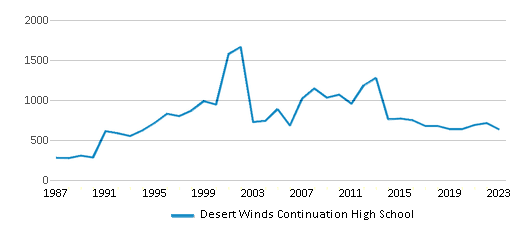
Gender %
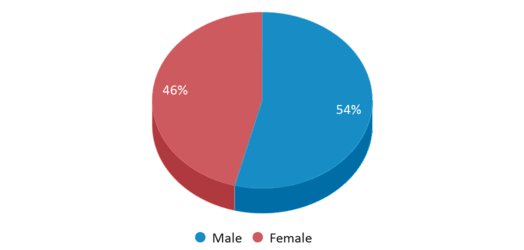
Total Classroom Teachers
28 teachers
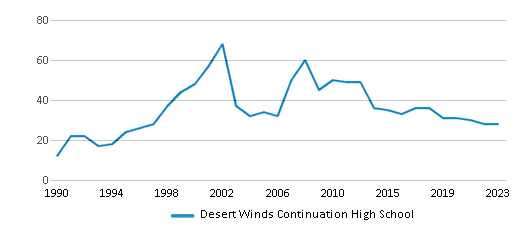
Students by Grade
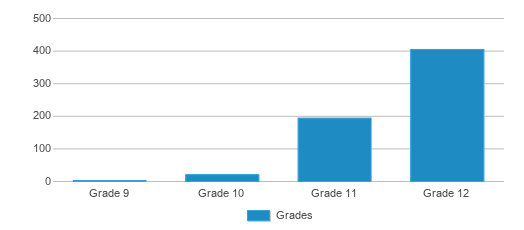
School Rankings
Desert Winds Continuation High School ranks within the bottom 50% of all 9,602 schools in California (based off of combined math and reading proficiency testing data).
The diversity score of Desert Winds Continuation High School is 0.58, which is less than the diversity score at state average of 0.63. The school's diversity has stayed relatively flat over five school years.
Overall Testing Rank
#9575 out of 9602 schools
(Bottom 50%)
(Bottom 50%)
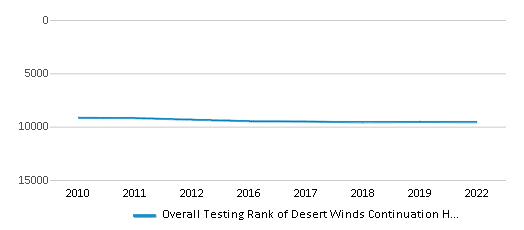
Math Test Scores (% Proficient)
≤1%
33%
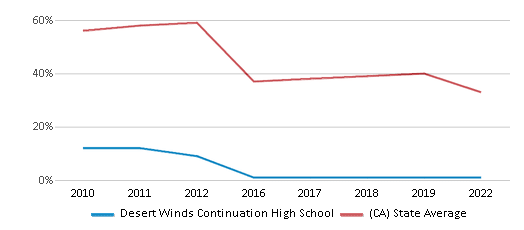
Reading/Language Arts Test Scores (% Proficient)
12%
47%
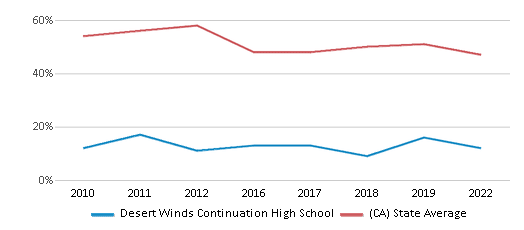
Science Test Scores (% Proficient)
≤5%
29%
Student : Teacher Ratio
22:1
21:1
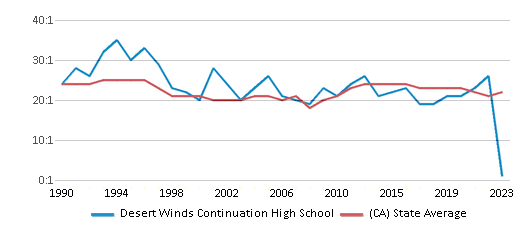
American Indian
n/a
1%
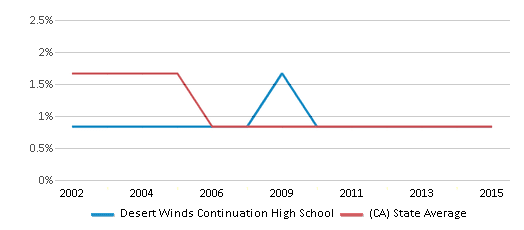
Asian
1%
12%
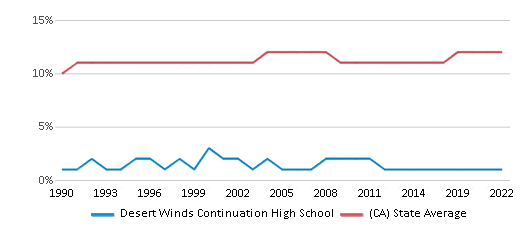
Hispanic
57%
56%
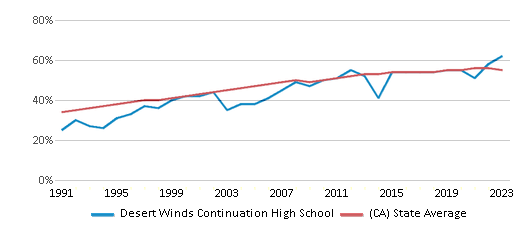
Black
30%
5%
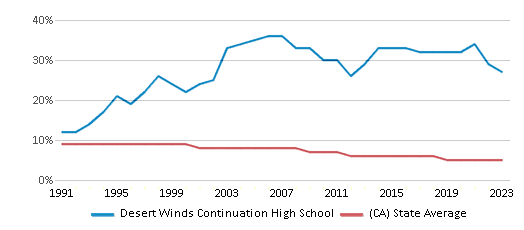
White
6%
20%
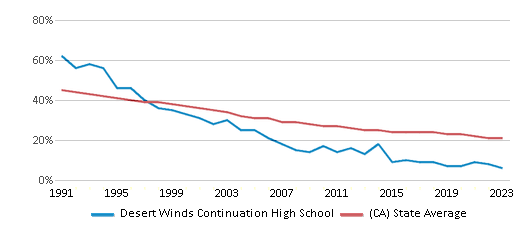
Hawaiian
n/a
n/a
Two or more races
6%
6%
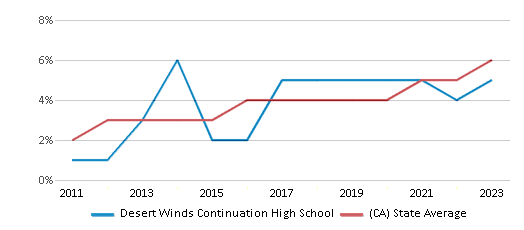
All Ethnic Groups
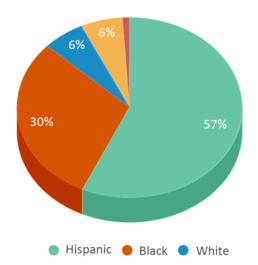
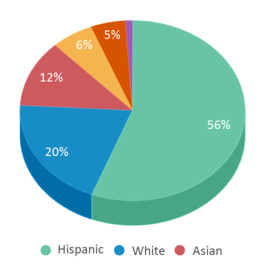
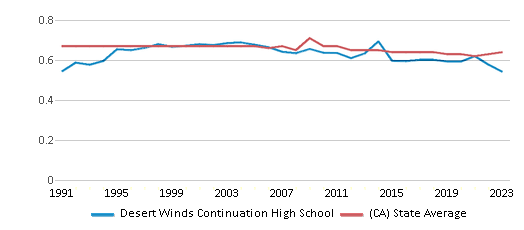
Graduation Rate
40-44%
87%
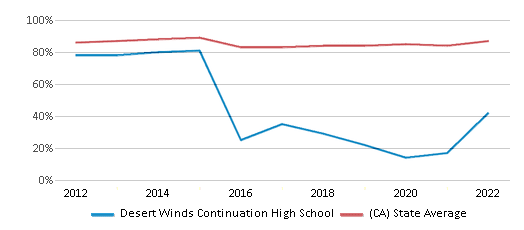
Eligible for Free Lunch
75%
54%
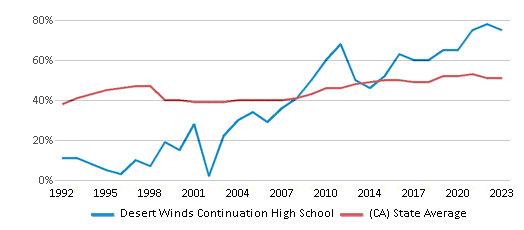
Eligible for Reduced Lunch
4%
8%
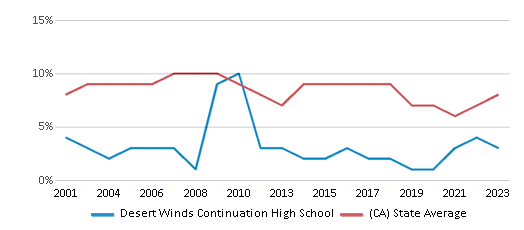
School Statewide Testing
School District Name
Source: National Center for Education Statistics (NCES), CA Dept. of Education
Profile last updated: 02/09/2025
Frequently Asked Questions
What is Desert Winds Continuation High School's ranking?
Desert Winds Continuation High School is ranked #9575 out of 9,602 schools, which ranks it among the bottom 50% of public schools in California.
What percent of students have achieved state testing proficiency in math and reading?
≤1% of students have achieved math proficiency (compared to the 33% CA state average), while 12% of students have achieved reading proficiency (compared to the 47% CA state average).
What is the graduation rate of Desert Winds Continuation High School?
The graduation rate of Desert Winds Continuation High School is 40-44%, which is lower than the California state average of 87%.
How many students attend Desert Winds Continuation High School?
623 students attend Desert Winds Continuation High School.
What is the racial composition of the student body?
57% of Desert Winds Continuation High School students are Hispanic, 30% of students are Black, 6% of students are White, 6% of students are Two or more races, and 1% of students are Asian.
What is the student:teacher ratio of Desert Winds Continuation High School?
Desert Winds Continuation High School has a student ration of 22:1, which is higher than the California state average of 21:1.
What grades does Desert Winds Continuation High School offer ?
Desert Winds Continuation High School offers enrollment in grades 9-12
What school district is Desert Winds Continuation High School part of?
Desert Winds Continuation High School is part of Antelope Valley Union High School District.
School Reviews
5 6/29/2019
This school changed my life. Unfortunately it gets a bad rap for the simple fact that it is a continuation high school. I''d never change a thing. This school, the teachers, principal, guidance counselors, etc., helped me get my life back on track and realize the importance of an education when I had given up on myself. When parents are too busy to care and/or you''re on your own it was truly remarkable to have people who dedicate their lives to your future. DW did just that for me. I earned enough credits in my first of 2 years at DW to go back and graduate from QHHS but I chose to graduate from DW because I was PROUD to be a part of this school and I wanted to represent it by showing my pride being a DWHS graduate. They never gave up on me and I won''t give up on them and all of their hard work. I wasn''t going to give another school credit for everything this school gave me. Get over the stigma of this school, no harm admitting you had a bit of trouble or needed extra help. My life turned out amazing. I have a successful career, marriage & family 30+ years after graduating from here. This school made it possible. Sometimes it just takes a little extra help and people to believe in you and help see you through your goals.
Review Desert Winds Continuation High School. Reviews should be a few sentences in length. Please include any comments on:
- Quality of academic programs, teachers, and facilities
- Availability of music, art, sports and other extracurricular activities
Recent Articles

What Is A Charter School?
Explore the world of charter schools in this comprehensive guide. Learn about their history, how they operate, and the pros and cons of this educational innovation. Discover key facts about charter schools, including admission policies, demographics, and funding, as well as what to look for when considering a charter school for your child.

10 Reasons Why High School Sports Benefit Students
Discover the 10 compelling reasons why high school sports are beneficial for students. This comprehensive article explores how athletics enhance academic performance, foster personal growth, and develop crucial life skills. From improved fitness and time management to leadership development and community representation, learn why participating in high school sports can be a game-changer for students' overall success and well-being.

February 05, 2025
Understanding the U.S. Department of Education: Structure, Impact, and EvolutionWe explore how the Department of Education shapes American education, from its cabinet-level leadership to its impact on millions of students, written for general audiences seeking clarity on this vital institution.





